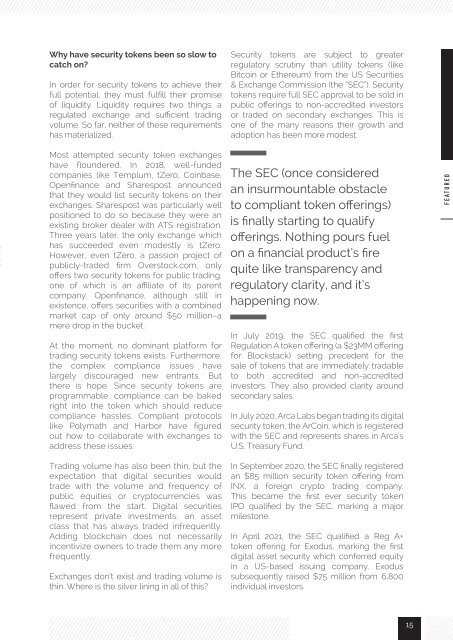NCFA Fintech Confidential October 2021 (Issue 4)
The National Crowdfunding & Fintech Association of Canada (NCFA) and partners are excited to present Vol. 1 Issue 4, FINTECH CONFIDENTIAL, a digital pop-up of the 7th annual 2021 Fintech & Financing Conference and Expo (FFCON21) held virtually from May 11-13 and co-hosted by NCFA and Toronto Finance International (TFI). As global economies strive to contain the latest Covid outbreak and recover fragile sectors, fintech innovators continue to ‘BREAK BARRIERS’, the main theme of this year’s conference, and the second year in partnership with TFI, reflecting the growth and emerging challenges that the Canadian Fintech industry must navigate to achieve mass adoption and scale. It’s been another unprecedented year with covid accelerating trends such as bitcoin’s institutionalization, the growing power of retail investors, the 2nd round of Open Banking consultations and the advisory committee’s recommendations to the federal government, payment modernization efforts, adoption of harmonized Crowdfunding regulation, AI roadmap, emergence of digital identity as a ‘right’ and core data infrastructure (ie., vaccine passports), growing support for Purpose (not just shareholder profit), green finance solutions tackling shared global problems such as SDGs and climate change, EDI (equality, diversity and inclusion), and regulatory push back and a firm ‘line in the sand’ for Big Tech. FFCON21 was a successful event attracting over 100+ thought leaders, 75 partners, 500+ attendees, an NFT charity fundraiser in partnership with CanadaHelps for front line workers, and our second annual 2021 Fintech Draft competition -- a pitching event inspired by sports league drafts and designed to identity emerging high growth fintech ventures. A hearty congratulations to the winners: Agryo (Overall) and Copia Wealth Studios (People’s Choice)! Thank you to all the partners, speakers, attendees, volunteers, and the entire organizing team for making ‘Breaking Barriers’ an impactful and amazing online experience and for being part of Canada’s fintech and funding community. We hope you enjoy reading this special edition of Fintech Confidential.
The National Crowdfunding & Fintech Association of Canada (NCFA) and partners are excited to present Vol. 1 Issue 4, FINTECH CONFIDENTIAL, a digital pop-up of the 7th annual 2021 Fintech & Financing Conference and Expo (FFCON21) held virtually from May 11-13 and co-hosted by NCFA and Toronto Finance International (TFI).
As global economies strive to contain the latest Covid outbreak and recover fragile sectors, fintech innovators continue to ‘BREAK BARRIERS’, the main theme of this year’s conference, and the second year in partnership with TFI, reflecting the growth and emerging challenges that the Canadian Fintech industry must navigate to achieve mass adoption and scale.
It’s been another unprecedented year with covid accelerating trends such as bitcoin’s institutionalization, the growing power of retail investors, the 2nd round of Open Banking consultations and the advisory committee’s recommendations to the federal government, payment modernization efforts, adoption of harmonized Crowdfunding regulation, AI roadmap, emergence of digital identity as a ‘right’ and core data infrastructure (ie., vaccine passports), growing support for Purpose (not just shareholder profit), green finance solutions tackling shared global problems such as SDGs and climate change, EDI (equality, diversity and inclusion), and regulatory push back and a firm ‘line in the sand’ for Big Tech.
FFCON21 was a successful event attracting over 100+ thought leaders, 75 partners, 500+ attendees, an NFT charity fundraiser in partnership with CanadaHelps for front line workers, and our second annual 2021 Fintech Draft competition -- a pitching event inspired by sports league drafts and designed to identity emerging high growth fintech ventures. A hearty congratulations to the winners: Agryo (Overall) and Copia Wealth Studios (People’s Choice)!
Thank you to all the partners, speakers, attendees, volunteers, and the entire organizing team for making ‘Breaking Barriers’ an impactful and amazing online experience and for being part of Canada’s fintech and funding community. We hope you enjoy reading this special edition of Fintech Confidential.
You also want an ePaper? Increase the reach of your titles
YUMPU automatically turns print PDFs into web optimized ePapers that Google loves.
Why have security tokens been so slow to<br />
catch on?<br />
In order for security tokens to achieve their<br />
full potential, they must fulfill their promise<br />
of liquidity. Liquidity requires two things: a<br />
regulated exchange and sufficient trading<br />
volume. So far, neither of these requirements<br />
has materialized.<br />
Security tokens are subject to greater<br />
regulatory scrutiny than utility tokens (like<br />
Bitcoin or Ethereum) from the US Securities<br />
& Exchange Commission (the “SEC”). Security<br />
tokens require full SEC approval to be sold in<br />
public offerings to non-accredited investors<br />
or traded on secondary exchanges. This is<br />
one of the many reasons their growth and<br />
adoption has been more modest.<br />
Most attempted security token exchanges<br />
have floundered. In 2018, well-funded<br />
companies like Templum, tZero, Coinbase,<br />
Openfinance and Sharespost announced<br />
that they would list security tokens on their<br />
exchanges. Sharespost was particularly well<br />
positioned to do so because they were an<br />
existing broker dealer with ATS registration.<br />
Three years later, the only exchange which<br />
has succeeded even modestly is tZero.<br />
However, even tZero, a passion project of<br />
publicly-traded firm Overstock.com, only<br />
offers two security tokens for public trading,<br />
one of which is an affiliate of its parent<br />
company. Openfinance, although still in<br />
existence, offers securities with a combined<br />
market cap of only around $50 million–a<br />
mere drop in the bucket.<br />
At the moment, no dominant platform for<br />
trading security tokens exists. Furthermore,<br />
the complex compliance issues have<br />
largely discouraged new entrants. But<br />
there is hope. Since security tokens are<br />
programmable, compliance can be baked<br />
right into the token which should reduce<br />
compliance hassles. Compliant protocols<br />
like Polymath and Harbor have figured<br />
out how to collaborate with exchanges to<br />
address these issues.<br />
The SEC (once considered<br />
an insurmountable obstacle<br />
to compliant token offerings)<br />
is finally starting to qualify<br />
offerings. Nothing pours fuel<br />
on a financial product’s fire<br />
quite like transparency and<br />
regulatory clarity, and it’s<br />
happening now.<br />
In July 2019, the SEC qualified the first<br />
Regulation A token offering (a $23MM offering<br />
for Blockstack) setting precedent for the<br />
sale of tokens that are immediately tradable<br />
to both accredited and non-accredited<br />
investors. They also provided clarity around<br />
secondary sales.<br />
In July 2020, Arca Labs began trading its digital<br />
security token, the ArCoin, which is registered<br />
with the SEC and represents shares in Arca’s<br />
U.S. Treasury Fund.<br />
FEATURED<br />
Trading volume has also been thin, but the<br />
expectation that digital securities would<br />
trade with the volume and frequency of<br />
public equities or cryptocurrencies was<br />
flawed from the start. Digital securities<br />
represent private investments, an asset<br />
class that has always traded infrequently.<br />
Adding blockchain does not necessarily<br />
incentivize owners to trade them any more<br />
frequently.<br />
Exchanges don’t exist and trading volume is<br />
thin. Where is the silver lining in all of this?<br />
In September 2020, the SEC finally registered<br />
an $85 million security token offering from<br />
INX, a foreign crypto trading company.<br />
This became the first ever security token<br />
IPO qualified by the SEC, marking a major<br />
milestone.<br />
In April <strong>2021</strong>, the SEC qualified a Reg A+<br />
token offering for Exodus, marking the first<br />
digital asset security which conferred equity<br />
in a US-based issuing company. Exodus<br />
subsequently raised $75 million from 6,800<br />
individual investors.<br />
15






